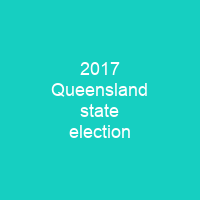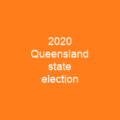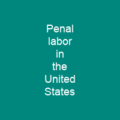The 2017 Queensland state election was held on 25 November 2017 to elect all 93 members of the Legislative Assembly of Queensland. The first-term incumbent Labor government, led by Premier Annastacia Palaszczuk, won a second term in government. Amendments to electoral laws increased the number of seats by four from 89 to 93 and changed the optional preferential voting system to compulsory full-preferential voting. Opposition Leader Tim Nicholls conceded defeat and announced he would step down as leader of the party.
About 2017 Queensland state election in brief

The redistribution increasing the size of parliament from 89 seats to 93 seats, Labor increased its representation by a net seven seats to a total of 48 seats, allowing it to form government in its own right by two seats. On 8 December 2017, Opposition Leader Tim Nicholls conceded defeat and announced he would step down as leader of the party. Later that day, PalasZczuk visited Government House and was invited to form a majority government by the Governor. The Second Palas zczuk Ministry was subsequently sworn in by theGovernor on 12 December 2017. The seats of Burdekin, Mansfield, and Mount Ommaney were won by the LNP at the2015 election, but redistributions in 2016 made them notionally Labor seats. One Nation won its first seat since 2009 and the Greens won a seat at a state election for the first time. The Shooting Industry Foundation of Australia used USD 550,000 to launch an advertising campaign, named Flick’em, in an effort to urge voters to put both major parties last in ballot paper preferences. This campaign boosted votes for Pauline Hanson’s One Nation and the Katter’s Australian Party and achieved lowest major party votes in QLD history.
You want to know more about 2017 Queensland state election?
This page is based on the article 2017 Queensland state election published in Wikipedia (as of Nov. 26, 2020) and was automatically summarized using artificial intelligence.







